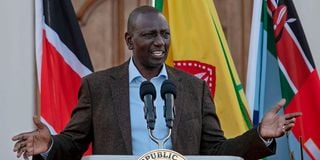Premium
Ruto: Let’s make two-thirds gender principle a reality

President William Ruto.
What you need to know:
- The Head of State has also called on political parties to support women leaders.
- Governor Waiguru also called on the Head of State to support women in various capacities.
President William Ruto has said his administration is committed to achieving the two-thirds gender principle.
The President said he is doing this through constitutional amendments to ensure that women are effectively represented in leadership positions in various arms of government.
President Ruto, who joined the seven elected women governors at the launch of the G7 strategy in Nairobi, urged MPs to support the proposals aimed at making the principle a reality.
“In the Bill that will be tabled in Parliament, we will ensure that more women are elected to Parliament for representation. This will be the official position of the Kenya Kwanza coalition and all MPs are expected to support the Bill. We have spoken to many leaders, including men, and for the first time they are committed to this cause,” President Ruto said.
The Head of State has also called on political parties to support women leaders, revealing that the United Democratic Alliance (UDA) is planning to introduce new rules in its constitution to alternate gender when fielding candidates for governorship and the presidency in the upcoming elections.
“We have to lead from the front as a party and we have to make rules that when Deputy President Rigathi Gachagua and I have decided on our line-up, we must also agree that if a man is the presidential candidate in our party, a woman must be the deputy and if a woman is the candidate, the running mate must be a man. And we have to cascade it down to the governors. We must be conscious and deliberate about it, otherwise it will not happen,” Dr Ruto said.
The seven women governors, led by Council of Governors Chairperson Anne Waiguru, said the caucus will focus on mentorship programmes. The caucus is currently focusing on increasing the number of women governors to at least 16 in the 2027 polls.
Ms Waiguru also called on the Head of State to support women in various capacities, especially in winning the presidential seat.
“We fully support the President to achieve his 10-year development vision and immediately after his two terms, there is no other promise to support anyone else. We urge him to hold the hand of a woman so that she can also clinch the top seat in this country because as women we are ready,” said Ms Waiguru.
Previous legislative attempts to implement the two-thirds gender principle have stalled due to lack of support from MPs.
In 2020, former Chief Justice David Maraga recommended that Parliament repeal the law because it did not meet the two-thirds requirement.
The National Dialogue Committee report adopted by Parliament has recommended the implementation of the two-thirds rule as a way of ensuring gender parity in electoral processes.
A multi-sectoral working group on the two-thirds gender principle, led by Gender Cabinet Secretary Aisha Jumwa, last week submitted a report, which is currently before Parliament, with a number of recommendations on how to achieve gender parity.
The report recommends a constitutional amendment to appoint 53 more women to the National Assembly and two more to the Senate to meet the constitutional threshold.
It also proposes the amendment of the Political Parties Act 2011 to establish the Women’s Inclusion and Political Participation Fund to finance the training, mentoring and empowerment of women seeking elective positions.
The team also recommended that the Electoral Act 2011 be amended to provide for the submission of party lists that meet the gender rule.





